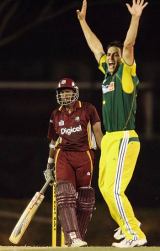
|

'There seems to me a clear distinction between "live" coverage of an event, where it is mandatory to call it as it is - whether good, bad or indifferent'
© AFP
|
|
See what I mean? Cuss for so one day, praise and hope for greater things the next. Victory over India on the Duckworth/Lewis system might have a bit of a hollow ring to it, but after the dispiriting collapse against Australia on Tuesday, most West Indies fans will just be grateful to get a win yesterday to stay in contention for a place in the final of the DLF Cup.
Yet, just as the extreme reaction suggesting that it was the end of civilisation as we knew it after the West Indies lost nine wickets for 29 runs was overdone, so is getting carried away with a fifth consecutive ODI victory against a team that is ranked among the best in the world.
Keep in mind that, while the time may be short, there is a long way to go in terms of matches to play in the countdown to the ultimate ambition of making a very strong showing as hosts of the 2007 World Cup. The one comfort is that at least we can't do any worse than the last two hosts (England and South Africa failed to make it past the first round in 1999 and 2003).
In this tournament in Kuala Lumpur, there are still two more preliminary matches next week and, if we manage to make it, the final next Sunday. Then there's the Champions' Trophy, involving three preliminary matches against Zimbabwe, Bangladesh and Sri Lanka. Assuming we make it into the main draw as one of the top two teams, there are three more group matches followed by the semi-finals and the final if Brian Lara's men advance that far in defence of the title.
Three Tests in Pakistan in November are the only break from the almost non-stop schedule of one-day cricket, but that is only a temporary respite as the regional side will take on the Pakistanis in five ODIs to round out a three-month journey through Asia before they return to India at the start of the new year for four more money-spinning one-dayers. In a best-case scenario, that means a schedule of 20 more ODIs over the next four months, and that doesn't include the warm-up matches to be played here in the Caribbean in the immediate lead-up to the World Cup.
So to get carried away one way or the other at this early stage of the taxing schedule is really to raise blood pressure or optimism, or both, to dangerously high levels. Leave that for December, January and February, when there will be enough recent evidence on the field to give a fair indication of what can be expected by the time West Indies take the field in the opening World Cup match against Pakistan at refurbished Sabina Park on March 13.
One issue that I think is worth talking about, however, in the aftermath of the 78-run capitulation to Australia is the suggestion that the Caribbean media are being unpatriotic by sensationalising the loss and should really be encouraging and supporting the team at this vital stage of the lead-in to the World Cup.
This is something that raises questions about what is known as "developmental" journalism as against just reporting the facts as they are, good or bad, and let the public be the judge. I have to say that I have never seen the role of the sports media as being unofficial supporters of any individual or team as part of their duty as responsible citizens.
Many may see it otherwise, especially in the aftermath of the intense national fervour surrounding our first-ever appearance at the World Cup football finals, but the job of the sports media cannot be to boost deflated spirits. Victories have to be reported with due fanfare, while defeats must not be glossed over for the sake of not wanting to be seen as kicking the boys when they are down.
I've been surprised over the years at how many people, in all walks of life and all levels of education, who are firmly convinced that personnel in the electronic media especially must be positive and uplifting in our reporting and "live" commentary, virtually taking up the role of defenders of our teams and our individual sportsmen and women in the face of criticism from foreign colleagues.
There seems to me a clear distinction between "live" coverage of an event, where it is mandatory to call it as it is - whether good, bad or indifferent - and comment and opinion pieces like this column which offers scope for personal views and interpretation.
As it is not an exact science, there are obviously times when the line between the two is blurred, especially over a seven-hour day of cricket commentary which lends itself to all sorts of old talk, but I believe the fundamental premise should be to call things as they are.
Should a West Indian commentator adopt a downbeat tone if Makhaya N'tini uproots Brian Lara's middle stump, but celebrate to the high heavens if Ricky Ponting falls to Corey Collymore for a duck? There are many in the profession who see their role as cheerleaders and are convinced that it is their duty to wave the flag. Are they on the ball, or playing the popularity game?
Just something to think about over the weekend.

